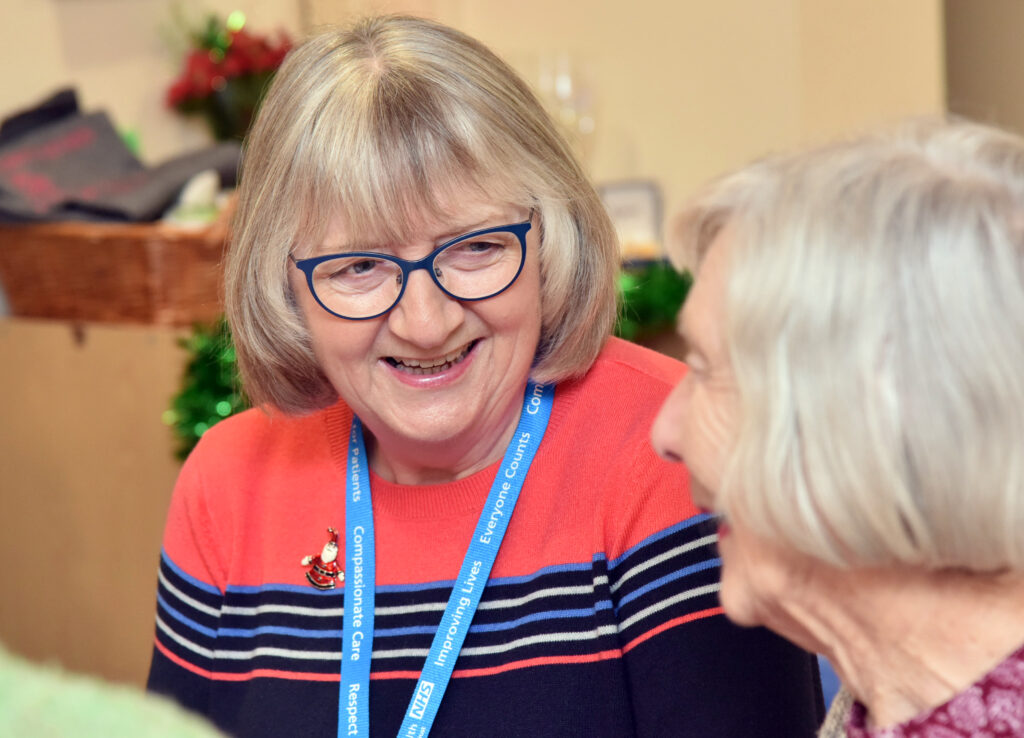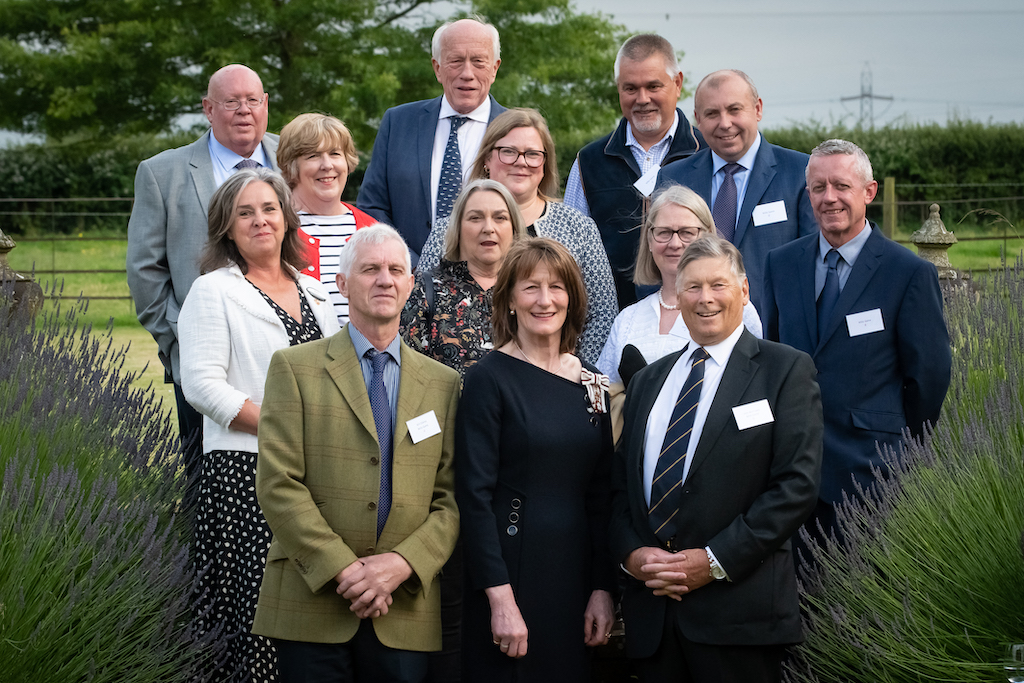Neil Thomas meets an inspiring group of volunteers, making a vital contribution to their town’s hospital.
Shropshire has lost many of its community hospitals over the years as the NHS has sought to centralise services in Shrewsbury and Telford.
Several towns were left without their own service after the wholesale axing of cottage hospitals in the early 1990s.
Bridgnorth is one of a few notable exceptions. Despite the threat of closure, the town has not only retained its hospital but it has undergone impressive modernisation, with state-of-the-art facilities and the latest medical equipment.
Much of this is down to an organisation of dedicated volunteers. The League of Friends of Bridgnorth Hospital has not only been at the heart of the community drive to retain this much-prized asset, but works tirelessly to add to it.
The League’s fundraising efforts have made a tangible difference to what the hospital can offer. Recent contributions include:
£150,000 worth of state-of-the-art digital X-ray equipment purchased in 2018, enabling a more comprehensive radiography service to be provided locally.
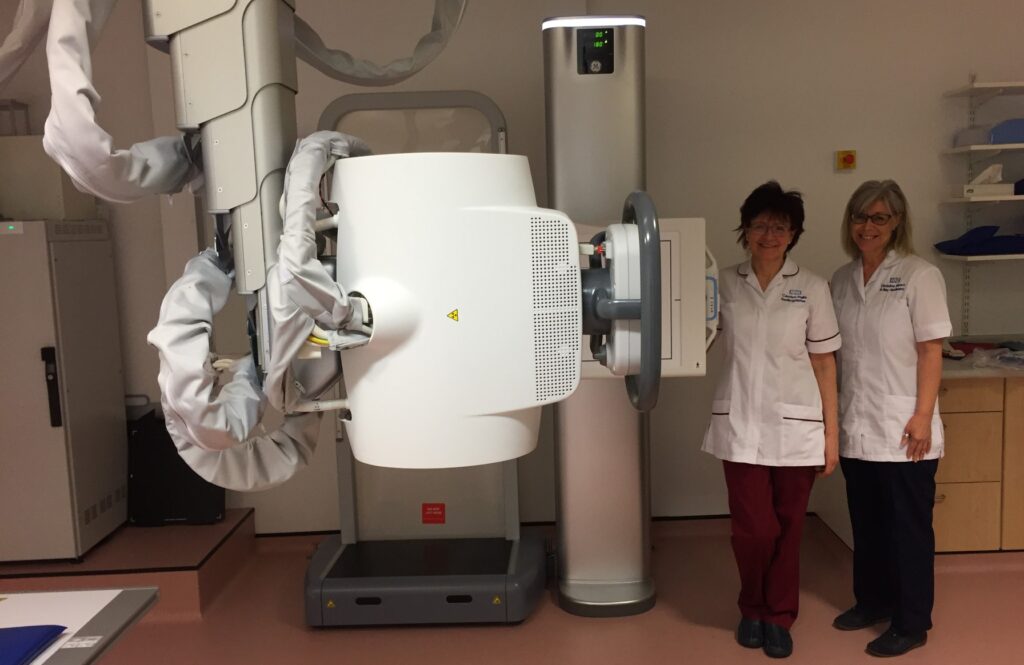
More than £106,000 in 2021 for new equipment to decontaminate cystoscopes used to diagnose bladder cancer, used for the benefit of patients from Shropshire and beyond.
Last year, 10 wide seat chairs with drop down arms and extendable legs, suitable for use by amputees.
New lockers and wardrobes to go beside all the beds. The items are easily cleanable and have large lockable compartments for medication.
A vital statistics monitor.
Christmas lights for the ward and quadrangle.
As the final item illustrates, cheering the place up to lift the mood of patients has its place, alongside making a vital contribution to maintaining health and saving lives.
All the league’s volunteers have their own personal motivations but are united in a common goal.
“Ultimately, we are all here for our community hospital,” says the group’s chair, Paula Tristham.
Paula’s association could not be more long-standing. “I was born in the hospital,” she says.
Her CV for her role could hardly be more apt. She has a nursing background, at the Royal Shrewsbury Hospital then in Queen Alexandra’s Royal Army Nursing Corps during a 30-year military career.
“I was looking for a volunteering role after retiring from the army and was accosted to get involved in the hospital,” she recalls with a smile.
Paula’s nursing experience and army leadership skills saw her recruited in 2019 to the League’s management team as part of the 14-strong board of trustees. She became board vice-chair in 2020 and acting chair through the Covid crisis of 2020-21.
Her drive and organisational ability were an obvious fit for the League of Friends and she very much leads from the front.
She is, though, the first to pay tribute to the work of all the League’s volunteers.
“Everyone makes a vital contribution,” she says.
Not least secretary Sue Burrows, who combines the administrative duties of the role with that of publicity officer. This is a key post, for spreading the word about the League’s work and raising its profile are important to both fundraising and recruiting more volunteers.
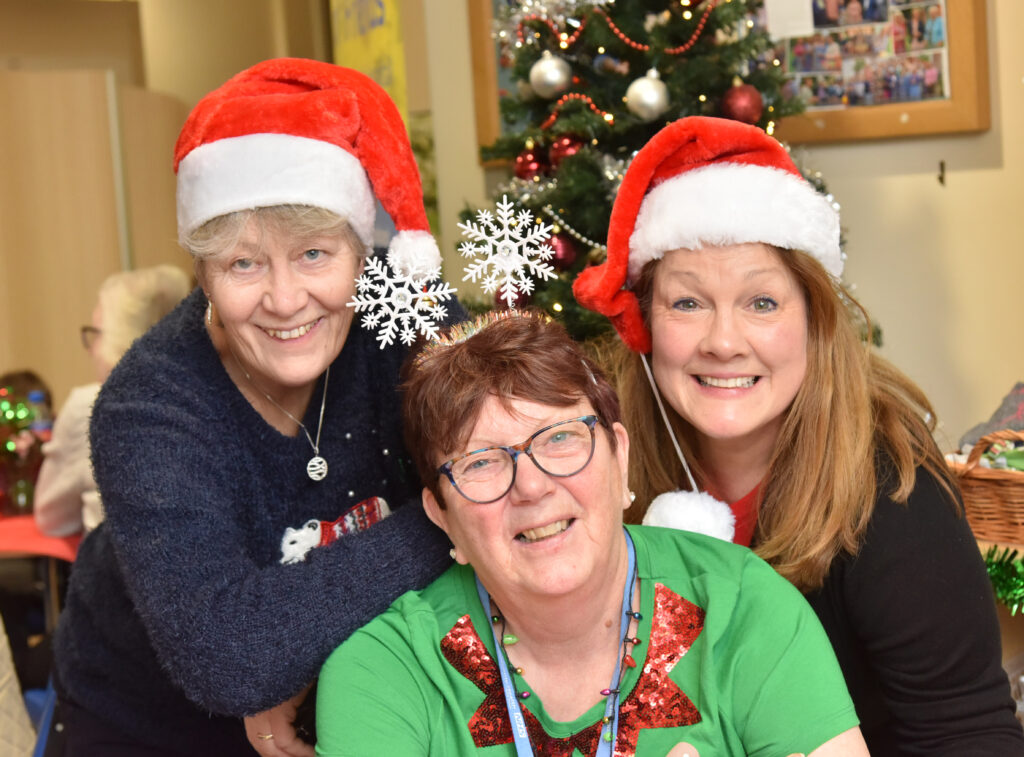
“I’ve been involved for eight years now,” reflects the former police officer. “I was looking to get involved in volunteer work and was brought in by Verena.”
That’s Verena Swinnerton, manager of the League of Friends Coffee Shop for the past eight of her 10 years as a volunteer.
“I was at the hospital quite a lot for blood tests at one time and wanted to give something back when I retired,” adds Verena, whose job at Apley Farm Shop, near Shifnal, was a useful background for her current role.
Though none of the volunteers do what they do for public acclaim, it’s nevertheless lovely to receive. So when Margaret Bray and Jean Prior received awards for their service to the League of Friends from then High Sheriff Selina Graham in January 2023, it put the charity’s work in the spotlight and was recognition that the whole organisation could take pride in.
The stalwart volunteers were recognized for ‘great and valuable services to the community’. Both are trustees, help to run the Knit and Natter group and Butterfly Café as well as volunteering in the League of Friends Coffee Shop.
“They are involved in everything we do,” says Sue.
The Knit and Natter group meets every Tuesday, 2-4pm, in the Coffee Shop where, as the name suggests, ladies get together to knit and chat.
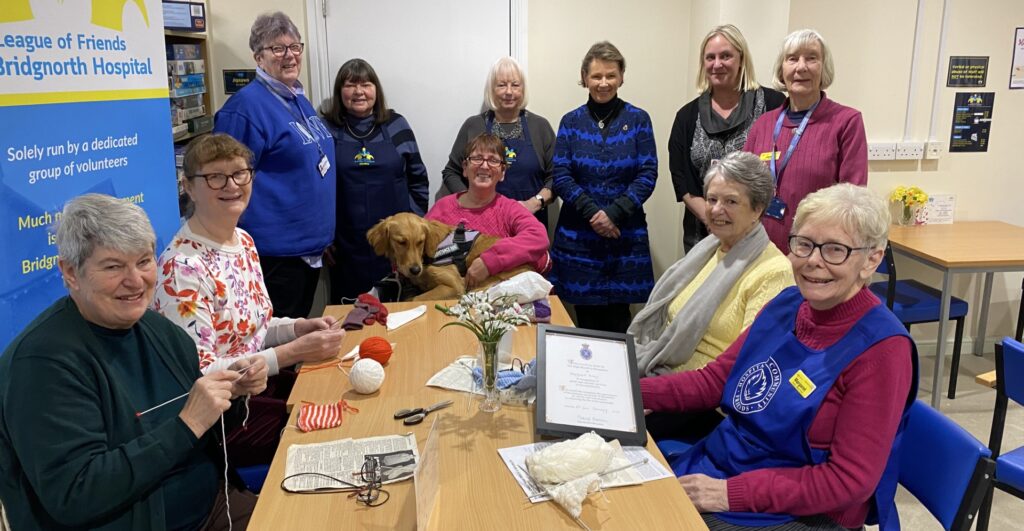
“We raise funds by selling items that we knit, which include baby clothes, blankets, stump socks and items of crochet,” explains Jean. “It’s also a very enjoyable social occasion, with around 15 to 20 knitters attending regularly.”
During the past couple of years, poppies have been made and displayed in a waterfall fountain at St Mary’s Church as well as distributed to patients and staff at the hospital. Last year, for the first time for several years, the League laid a wreath on Remembrance Sunday and took an active role in raising awareness about the Armed Forces Community.
The Butterfly Café is held on the first Friday of the month, again in the Coffee Shop. It is to support people with dementia and memory loss, with a wide range of activities including pot painting, wreath making, bingo and day trips. Around 30 people regularly attend. Indeed, it has been such a successful initiative that an extra informal ‘drop in’ session has been introduced this year on the third Friday of the month, offering tea, cake, and a chat.
Volunteers in the Butterfly Café not only bring invaluable life experience to their role but the specific skills required to safeguard vulnerable people.
The Butterfly Café was originally run independently within the hospital by NHS nurses but when they retired during the pandemic, the League ensured the scheme’s future by agreeing to take over entire responsibility for its administration and financing.
Incidentally, the scheme’s name comes from the association of nature, and in particular butterflies, with enhancing mental, physical and emotional wellness. The sighting of a butterfly can lift the spirits and the tiny winged creature, with its exotic colours, it often viewed as a symbol of hope and recovery.
On the subject of butterflies, in 2022 the League introduced their new caterpillar mascot, Campbell, or Cami for short. The caterpillar – the larval stage of the butterfly – was chosen to represent the fact that without change there would be no butterflies.
“Cami’s aim is to generate interest and support from younger members of the community,” explains Sue.
Paula adds: “It is important to try to interest youngsters in what we are doing because they are our supporters and volunteers of the future.”
While there is no substitute for age and experience, the army of more than 60 volunteers is largely made up of those of retirement age and above.
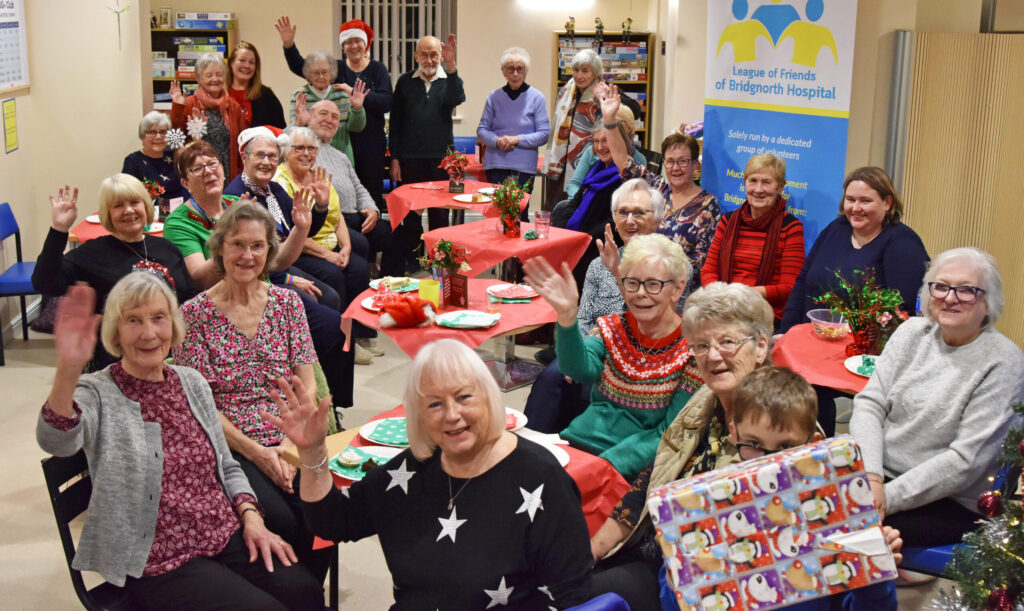
“The fact is our membership is dwindling and we are going to need a bit of younger blood. It is important that we look to the future by trying to appeal to as broad an age- range as we can,” Paula adds.
“Volunteers can give whatever time suits them, from a couple of hours a month to a more regular involvement. It’s up to them. We’d love to hear from anyone who is interested,”
Cami plays an active role in events such as traditional coffee mornings as well as helping to distribute presents to patients on the ward at Easter and Christmas. Last year Cami had the honour of helping Lenny from Bridgnorth Lions and League President and Mayor Rachel Connolly to switch on the town’s Christmas lights.
Fundraising for the hospital is, of course, at the very heart of the League’s purpose. A regular source of income, introduced in 2006, is the 100+ Club, run by June Muxworthy. It costs £12 a year to take part with the opportunity to win cash prizes in a quarterly draw (for more information email 100bridgnorthlof@gmail.com).
The membership scheme is another regular revenue stream. Membership of the League of Friends costs £6 a year for an individual and £8 for joint/family membership. Application forms are available from the Coffee Shop or via email (bridgnorthlof@gmail.com).
The principal source of income is, of course, the Coffee Shop, where the majority of volunteers work in shifts ranging from a couple of hours a month to longer weekly shifts.
It is hugely popular with all who use the hospital and it is easy to see why, with its bright, welcoming aura. Boasting a top food hygiene rating, it is open Monday to Friday, 9.30am to 4pm, serving light refreshments and home-made cakes supplied by the aptly named Margaret Baker, known as Ma Baker.
Second-hand books are also available from a well-stocked library, run by Peter and Sarah Morford. The café also sells brand new baby and toddler knitwear, greeting cards and jigsaws.
Volunteers are the lifeblood of any charity and Bridgnorth Hospital League of Friends boasts some absolute troopers – people like Chris Bray who has been involved for 30 years.
Last year, the League bid farewell to an icon. Its vice president Margaret Veal MBE died in September at the age of 96 and is much-missed. Margaret, who received her honour from Prince William in 2018, was a founder member of the League in 1958.
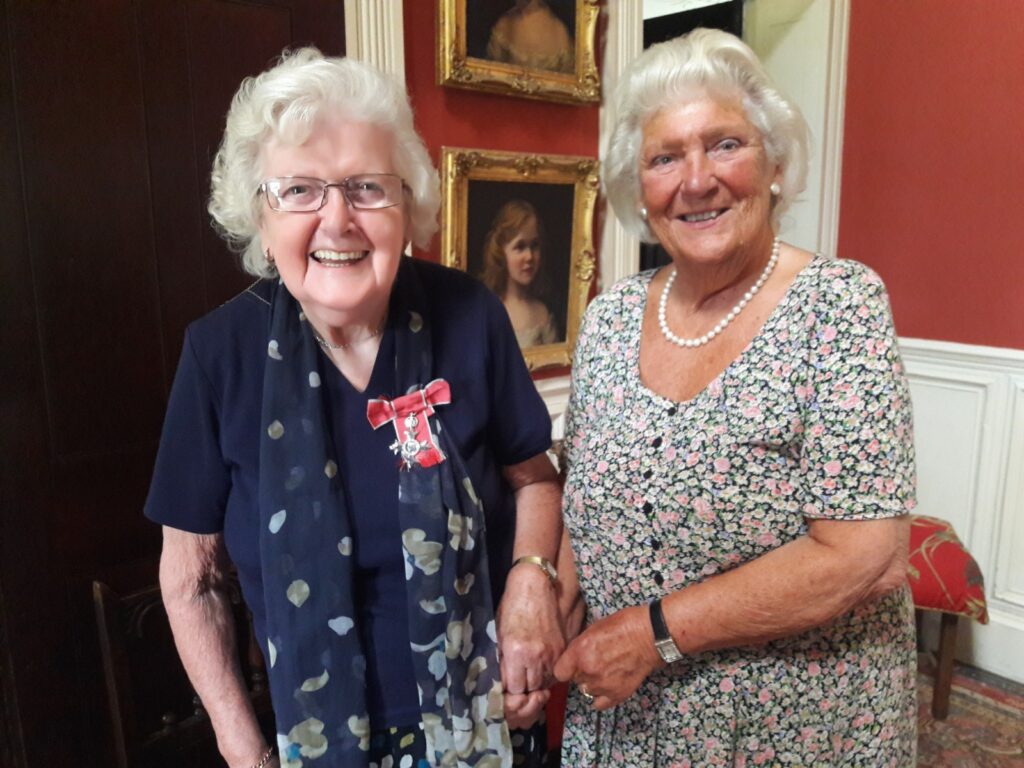
Initially, the charity was called the League of Friends of Bridgnorth Hospitals, reflecting the fact that it incorporated Innage House, an elderly people’s home with a sick bay and Oldbury Grange Royal National Institute for the Blind (RNIB) Rehabilitation School as well as Bridgnorth and South Shropshire Infirmary as it was then called.
The League relinquished responsibility for the former two in 1971 when the RNIB moved to Nottingham and Coverage Care took over Innage House.
The infirmary has a long history, having been established in the 1830s in Listley Street and Hollybush Road. When it became the state-of-the art new building in Northgate – the hospital we know today – the League of Friends played a pivotal role, not least in funding some of the equipment required for a 21st century health complex.
It is easy to take a hospital for granted – always there when needed. NHS funding challenges bring a drive for centralisation and the sharing of services, putting smaller hospitals at risk of closure. When Bridgnorth faced such a threat, the town rallied behind its hospital in a truly inspiring way. At the heart of the fight was The League of Friends. Friends indeed.

